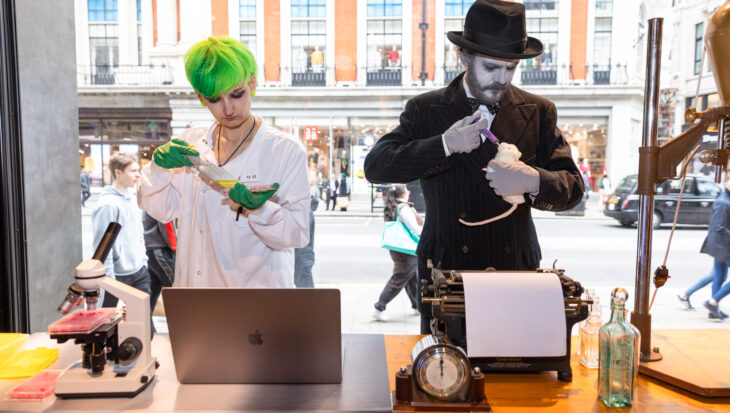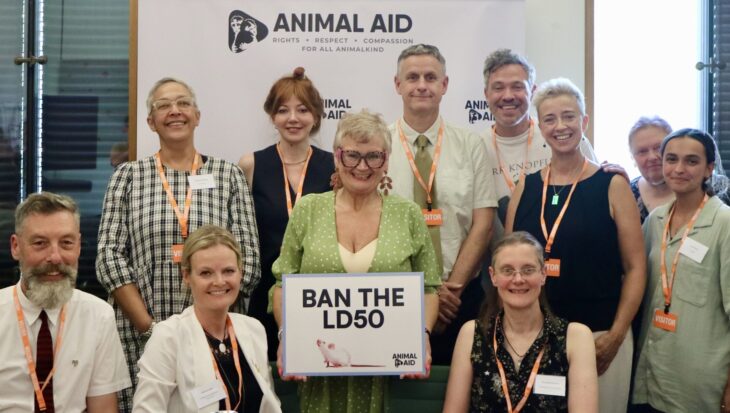Animal Aid has pledged to campaign more robustly than ever against the large-scale suffering involved in the breeding and use, in biomedical experiments, of genetically modified mice. The undertaking comes in response to a decision by the Advertising Standards Authority (ASA) to uphold a complaint by a pro-vivisection lobby group against the content of an advert that the national campaign group placed in three national newspapers in June 2013.
The ad listed some of the torments to which GM mice are subjected in British labs and pointed out that many of the experiments are funded by medical research charities. It called on readers to send for a list of those charities that do and those that don’t fund vivisection.
GM animals in British labs, said the ad, are poisoned, injected with acid and given electric shocks. Lobby group Understanding Animal Research did not contest these statements, and while it disputed that GM mice in British labs had been made to suffer seizures, Animal Aid submitted evidence to the ASA proving that this was indeed the case.
The ASA ruled against Animal Aid on three points. See Editors’ Notes for details and our response.
Says Animal Aid Director Andrew Tyler:
‘It is incontestable that, in British laboratories, GM mice suffer grievously and that some of this suffering is funded by leading medical research charities. Even the pro-vivisection lobby group that complained about our advert to the ASA could not dispute that animals have been given electric shocks, poisoned and injected with acid in British labs. Its complaints were based on hair-splitting and are without substance. That the ASA ruled in its favour is, sadly, to be expected from a body that is inclined to side with the animal research establishment, however weak its position. The work that Animal Aid started in February 2013, with the publication of Science Corrupted: the nightmare world of GM mice, will not be derailed by the ASA’s perverse ruling. Far from it. We will push forward with more determination than ever.’
Notes to Editors
- The ASA ruled against Animal Aid on three points:
- The photograph of a mouse in the ad had been taken at an American laboratory.
- The visible tumour seen in the mouse photo resulted not from genetic modification but from cancerous tissue being transplanted under the skin.
Our response
Animal Aid conceded that the photo was from America but argued that ‘it is extremely difficult to obtain images from the animal research establishment [in Britain] of genetically modified mice with disfiguring or deforming lesions, and even more so to obtain permission to publish them. We considered that the image we used ‘was a fair representation of the appearance, deformity and consequent suffering endured by those mice in British labs who have tumours produced by genetic alteration’.
- The statement that mice in British labs were genetically programmed to suffer burst hearts and to rip at their own flesh could not be supported, the ASA judged. In addition, the claim, ‘Your money is paying for the creation of genetically modified animals…’ was said to be misleading because it suggested that public money, rather than money donated to research charities, was funding the experiments.
Our response
Animal Aid submitted evidence clearly demonstrating how experiments to create genetically modified mice, and then subject them to experiments involving artificially induced heart attack with a risk of cardiac rupture (‘burst hearts’), have been conducted in Britain. We also presented documentation showing that self-injuring GM mice ‘models’ of obsessive compulsive disorder are described in UK scientific literature and that the over-grooming behaviour by these animals results in skin lesions and hair removal.
Especially unfathomable was the ASA’s ruling that the ad implied that funds from the public purse rather than donations to medical research charities were funding some of the offending experiments. The ad clearly states, in bold, italic lettering, that many of the experiments are funded by medical research charities. And the tear-off coupon invites readers to send for details of which charities do and which don’t fund animal experiments. There is no reference to any other funding source.
- For more information or to arrange an interview with Animal Aid Director Andrew Tyler, please call 01732 364546.

